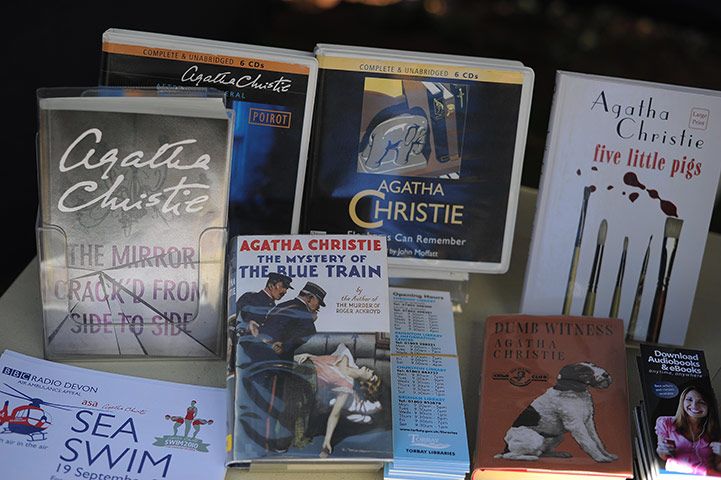The Enduring Appeal Of Agatha Christie's Poirot: A Critical Analysis

Table of Contents
Poirot's Unforgettable Character
The Eccentric Genius
Hercule Poirot is far more than just a brilliant detective; he's an unforgettable character. His eccentricities are as much a part of his charm as his unparalleled intellect. A "Hercule Poirot character analysis" reveals a man obsessed with order and symmetry, reflected in his perfectly waxed mustache and meticulous attire. His ego is considerable, bordering on comical, yet it's tempered by a genuine desire for justice. This combination of arrogance and compassion makes him both endearing and fascinating.
- Meticulousness: Poirot's legendary attention to detail is evident in every case. In Murder on the Orient Express, his observation of a seemingly insignificant detail – a broken hatpin – provides a crucial clue.
- Little Grey Cells: His famous "little grey cells" are the engine of his deductive prowess. He frequently uses this phrase to emphasize his intellectual superiority and methodical approach to solving crimes.
- Distinctive Appearance: Poirot's appearance – the waxed mustache, the impeccably tailored suits – is instantly recognizable, solidifying his iconic status within Agatha Christie's detective pantheon.
The Master of Deduction
Poirot's detective skills are legendary. His ability to unravel complex mysteries stems from a combination of sharp observation, logical reasoning, and profound psychological insight. Analyzing "Poirot's detective skills" reveals a masterclass in deduction. He doesn't merely collect facts; he interprets them, often anticipating the actions of criminals based on their personalities and motivations.
- Observation: In Death on the Nile, Poirot meticulously observes the subtle behaviours and interactions of the suspects, revealing hidden tensions and motives.
- Logical Reasoning: He uses a combination of inductive and deductive reasoning, building a logical chain of evidence to reach his conclusions. His method is often explained in detail, offering readers an insight into his brilliant mind.
- Psychological Insights: Poirot possesses an uncanny ability to understand human psychology, enabling him to anticipate the actions and motives of criminals. This element elevates his detective work beyond simple puzzle-solving. He solves mysteries by understanding the minds behind them.
The Enduring Appeal of Christie's Plots
Intricate Plots and Red Herrings
Agatha Christie's mastery lies not just in creating compelling characters but in crafting intricate plots filled with twists, turns, and misleading clues. "Agatha Christie's plot twists" are legendary, often leaving readers completely surprised by the final reveal. The use of red herrings is a hallmark of her style, designed to keep the reader guessing and actively involved in the process of deduction.
- Unexpected Twists: The shocking revelation in And Then There Were None is a testament to Christie's ability to construct a truly surprising and suspenseful narrative.
- Misleading Clues: Christie skillfully plants false leads and misleading clues, subtly diverting the reader's attention from the true culprit. This keeps the audience engaged and actively participating in the mystery.
- Suspenseful Narratives: The pacing of her stories is expertly controlled, building tension and suspense throughout the narrative, culminating in a satisfying and often shocking climax.
Exploration of Human Nature
Christie's stories delve deep into the dark side of human nature, exploring themes of greed, jealousy, revenge, and the capacity for both great good and terrible evil. "Themes in Agatha Christie's novels" frequently involve the exploration of human flaws and motivations, adding depth and complexity to the mysteries. Understanding these psychological aspects enhances the appreciation of her work.
- Greed and Ambition: Many of Poirot's cases involve characters driven by greed and an insatiable desire for wealth or power.
- Jealousy and Revenge: Love triangles, betrayals, and simmering resentments frequently serve as the motive for murder in her novels.
- The Complexity of Human Nature: Christie avoids simplistic portrayals of good and evil, presenting characters with complex motivations and hidden depths.
The Lasting Legacy of Agatha Christie's Poirot
Adaptations and Cultural Impact
The enduring popularity of Agatha Christie's Poirot is evident in the countless film, television, and stage adaptations of his stories. "Poirot adaptations" have showcased the character's enduring appeal to a global audience, with famous actors like David Suchet and Albert Finney embodying the iconic detective.
- David Suchet's Portrayal: Suchet's portrayal of Poirot in the ITV series is widely considered one of the definitive interpretations of the character.
- Kenneth Branagh's Films: Branagh's films have brought a new generation of viewers to the world of Poirot.
- Stage Adaptations: Numerous stage adaptations further demonstrate the character's adaptability and continued relevance in various media.
Continued Relevance in Modern Times
Despite being created decades ago, Agatha Christie's Poirot remains incredibly relevant to modern audiences. The "modern appeal of Poirot" lies in the timeless nature of his mysteries. The exploration of human nature, the intricate plots, and the enduring satisfaction of a well-crafted mystery continue to resonate.
- Timeless Themes: The themes explored in the novels – greed, jealousy, betrayal – are timeless human experiences that continue to intrigue and resonate with readers.
- Enduring Appeal of Mystery: The enduring appeal of a well-constructed mystery transcends generations, and Poirot’s cases continue to provide that satisfying puzzle-solving experience.
- Character's Enduring Charm: Poirot's unique personality and eccentricities make him a character that continues to fascinate and delight readers and viewers.
Conclusion
From his eccentric personality to the intricate plots that captivated generations, Agatha Christie's Poirot continues to offer a thrilling escape into the world of mystery. His enduring appeal stems from a masterful combination of compelling character, expertly crafted plots, and timeless themes that resonate with modern audiences. Rediscover the magic for yourself—dive into the world of Agatha Christie's Poirot today! Whether you choose to read the original novels, watch the acclaimed adaptations, or explore related materials, you're sure to find yourself captivated by the enduring legacy of this iconic detective.

Featured Posts
-
 Extreme V Mware Price Hike At And T Faces 1 050 Cost Increase From Broadcom
May 20, 2025
Extreme V Mware Price Hike At And T Faces 1 050 Cost Increase From Broadcom
May 20, 2025 -
 Wayne Gretzkys Daughter Paulina In A Mini Dress For A Playdate
May 20, 2025
Wayne Gretzkys Daughter Paulina In A Mini Dress For A Playdate
May 20, 2025 -
 March 22 Nyt Mini Crossword Answers Full Solutions And Clues
May 20, 2025
March 22 Nyt Mini Crossword Answers Full Solutions And Clues
May 20, 2025 -
 Navy Admiral Faces 30 Years For 500 000 Bribery Scheme
May 20, 2025
Navy Admiral Faces 30 Years For 500 000 Bribery Scheme
May 20, 2025 -
 Hamilton Vs Leclerc A Detailed Comparison Of Their 2023 Struggles
May 20, 2025
Hamilton Vs Leclerc A Detailed Comparison Of Their 2023 Struggles
May 20, 2025
